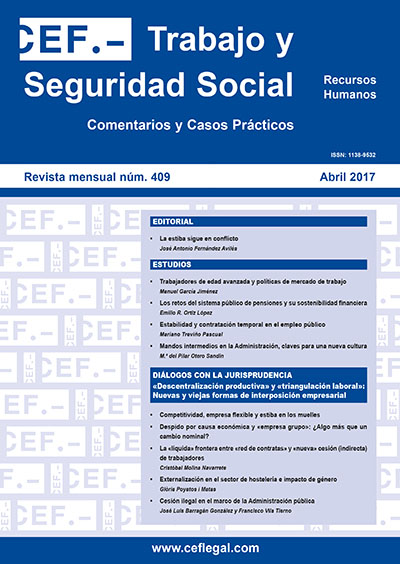Middle managers in the Spanish Public Administration. Key for a new culture
DOI:
https://doi.org/10.51302/rtss.2017.1894Keywords:
cultural change, middle management, public administration, lean managementAbstract
All human resources experts recognize that middle managers are an important key in all organizational structures. However, it is also a reality that they are mostly forgotten when defining and designing new policies, organizational and cultural changes.
If top managers are in charge of leading change in its first steps, middle managers are the cornerstone that keeps the flow of change moving in order to get consolidated. Success in achieving culture change does not depend on how leaders are, but on what they do.
In this paper, we present the defining notes of the middle managers in the Spanish public sector, the principles and tools of the Lean philosophy, which, although scarcely implanted in Spanish public bodies, are well known and applied in American and European public administrations, where it has proven its effectiveness to reduce costs, improve processing times, increase staff motivation and satisfaction. Within this Lean philosophy, we present the keys and habits of the middle managers that will allow maintaining the improvement over time, so cultural change consolidates.
Downloads
References
Ley 30/1984, de 2 de agosto, de medidas para la reforma de la Función Pública.
Ley 40/2015, de 1 de octubre, de Régimen Jurídico del Sector Público.
Real Decreto 364/1995, de 10 marzo, por el que se aprueba el Reglamento General de Ingreso del Personal al servicio de la Administración general del Estado y de Provisión de Puestos de Trabajo y Promoción Profesional de los Funcionarios Civiles de la Administración general del Estado.
Real Decreto Legislativo 5/2015, de 30 de octubre, por el que se aprueba el texto refundido de la Ley del Estatuto Básico del Empleado Público.
Dammand, J. [2014]: «Lean Management in hospitals: Evidence from Denmark», Administration and Public Management, 23.
Hines, P. [2011]: Staying lean, thriving not just surviving, New York: Productivity Press.
— [2004]: «Learning to evolve: A review of contemporary lean thinking», International Journey of Operations and Production Management.
Huy, G. Q. [2001]: «In praise of middle management», Harvard Business Review.
Kavanagh, S. C. [2010]:. Less time, lower cost, and greater quality: Making government work better with lean process improvement, Government Finance Officers Association and TechSolve.
Liker, J. S. [2007]: Toyota talent, McGraw-Hill.
— [2004]: Las claves del éxito de Toyota, Gestión 2000.
Losada Marrodán, 1995: «Las especificidades de la gestión pública: Implicaciones en la gestión directiva pública», Revista de Documentación Administrativa, págs. 241-242.
Luyster, T. y Shuker, T. [2000]: Value stream management, New York: Productivity Press.
Mann, D. [2005]: Creating a lean culture: Tools to sustain lean conversions, New York: Productivity Press.
Martín Rebollo, I. [2007]: Leyes Administrativas, Pamplona: Aranzadi.
Ministerio de Hacienda y Administraciones Públicas [2015]: Boletín Estadístico del Personal al servicio de las Administraciones Públicas, julio.
Ministerio de Hacienda y Administración Pública y Ministerio de la Presidencia [2015]: Informe de la CORA.
Muñoz, I. [2010]: Aplicación de la metodología de Dirección de Proyectos para la implantación de Lean en el sector sanitario, Universidad de La Rioja.
Pellicer Ibran, P. [1975]: «Estudio y consideraciones sobre la problemática de los mandos intermedios», Alta Dirección, 59.
Radnor, Z. [2010]: «Transferring lean into government», Journal of Manufacturing Technology Management.
— [2009]: Transferring Lean into Government, Coventry (UK): University of Warwick, Warwick Business School.
Radnor, Z.; Walley, P.; Stephens, A. y Bucci, G. [2006]: Evaluation of the lean approach to business management and its use in the public sector, Warwick Business School.
Ramió Matas, C. [2013]: La organización de los empleados públicos.
— [2012]: La extraña pareja. La procelosa relación entre políticos y funcionarios, Madrid: Catarata.
Rigby, D. y Bilodeau, B. [2007]: Management tools and trends 2007, 2009 y 2014, Bain & Company.
Rother, M. y Shook, J.: Learning to see: Value stream mapping to add value and eliminate MUDA, Spiral-Bound.
Sánchez Morón, M. et al. [2008]: Comentarios a la Ley del Estatuto Básico del Empleado Público, Valladolid: Lex Nova.
Tapping, D.; Luyster, T. y Shuker, T. [2002]: Value Stream Management, Productivity Press.
Torrubiano, J. [2007]: Por una Administración pública sin derroches, FEMP y Grupo Galgano.
Womack, J. y D. Jones. [2003]: Lean thinking, Barcelona: Gestión 2000.
Zokaei, K. [2010]: Lean and systems thinking in the public sector in Wales, LERC, Lean Enterprise Research Center, Cardif University.
Webgrafía
http://leanlogisticsexecution.blogspot.com
www.epa.gov/lean/leangovernment
www.gfoaconsulting.org
www.institutolean.org
www.lean.iowa.gov
www.leangovcenter.com
www.leanmanufacturing.es



















